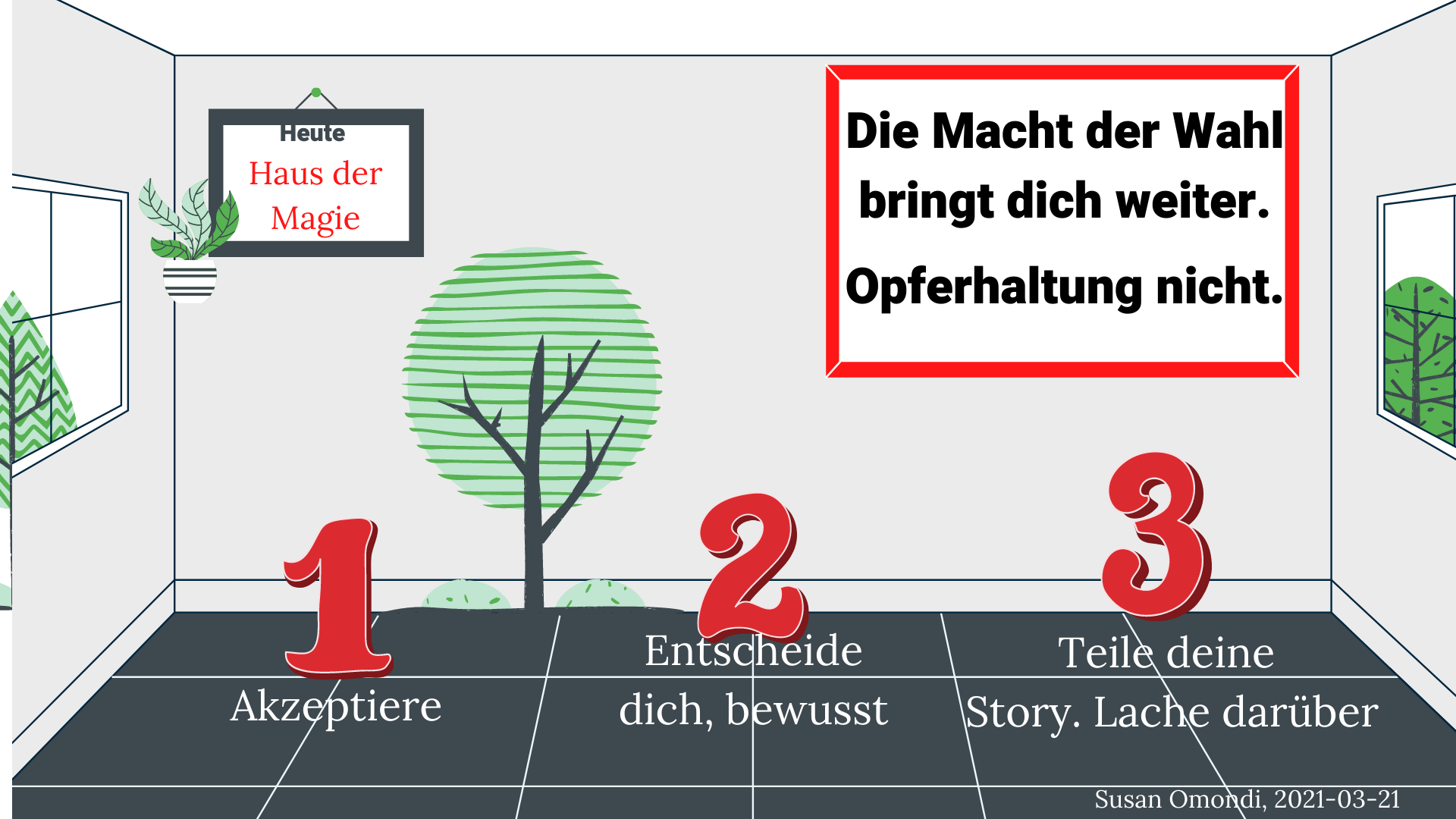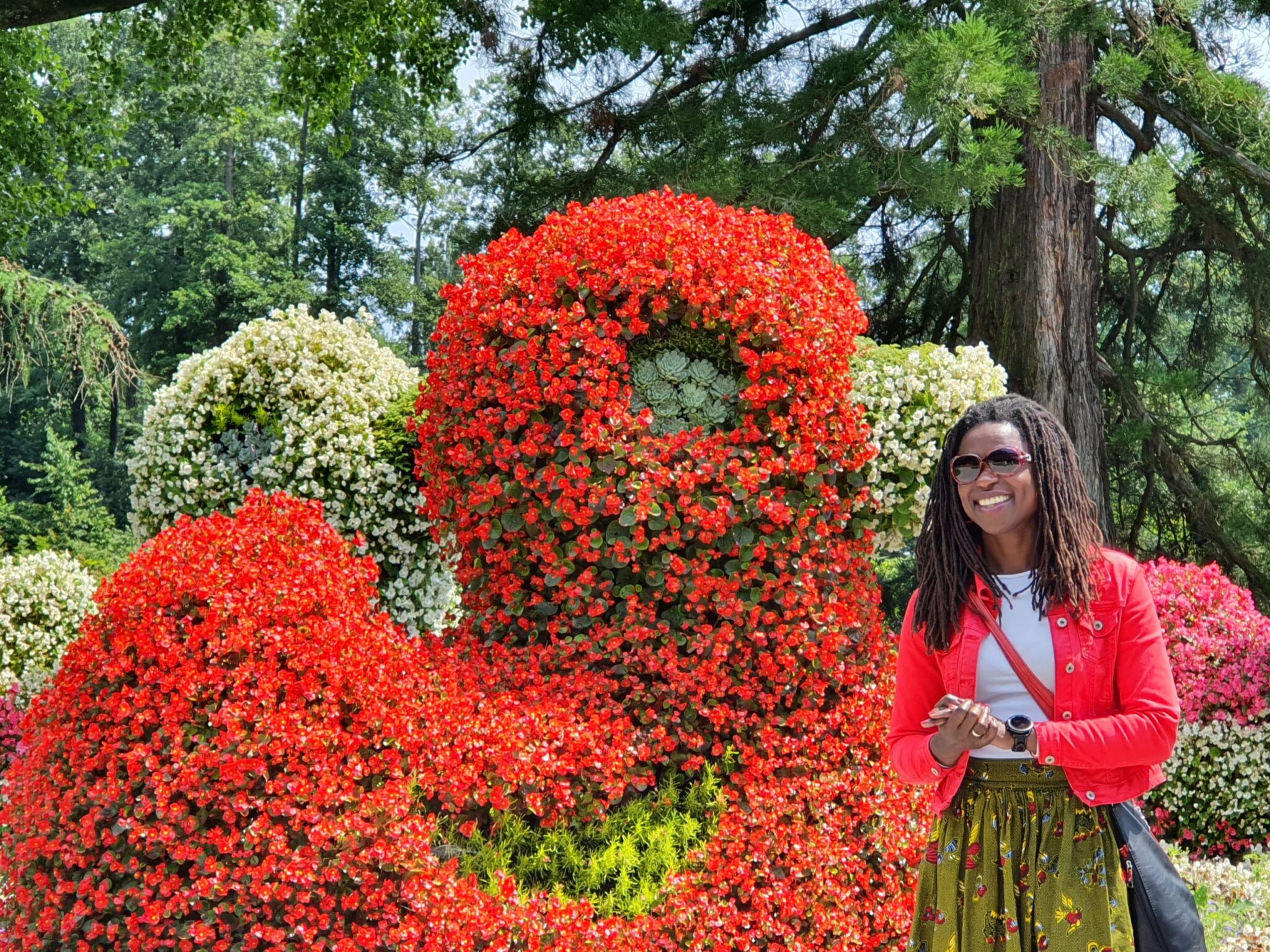
IT IS THE YEAR 1981, VERY EARLY IN THE MORNING, AROUND 6:30 AM
March 21, 2021
„SUSAN, THESE THINGS ARE STILL HAPPENING“
August 1, 2021Or how we also quietly inspire
In my lecture series “#Diversity and the magic in you” I consciously quote my mother, because she taught me (unconsciously and consciously) how to deal with diversity. I used to think that when relatives and neighbors called her “mother of girls” it was a compliment. It wasn’t.
Many reporters call the colorful life in Kenya “a world full of contrasts”.
I call that: diversity. A subject that is in vogue right now, but is in fact nothing new.
I am still convinced that if we internalize that diversity and dealing with it starts at home, and not only when we notice a difference in salaries between men and women in companies, we would celebrate diversity together more often.
Today I have 7 learnings from my mother for you. A woman with 11 children, who mostly raised her alone. You could say it’s your own fault. Yes you are right. It’s not about acknowledging that. She takes responsibility and therefore there was no whining in her place. The article focuses on their tools.
1. Posture and Dignity. Know your limit so you don’t keep making decisions.
“Anyone who does not delimit their circle of dignity clearly enough will have to reconsider every tempting offer, every deal. Not only is this a huge waste of time. It also erodes your self-respect and reputation – making you more vulnerable to future offers. A veritable vicious circle,” says Rolf Dobelli in his book “The Art of the Good Life.”
There were a number of issues that were just non-negotiable for my mother. I didn’t understand them before. I was too short-sighted. Now, with more life experience, I understand them more and more.
When I was short of tuition, many voices came to her saying, “You must report your husband,” “You must find another man who can take care of you,” “You could promise your girls to someone.”
Although she (felt) only had us – the circle of trust was not large – she retained her dignity. She has sharply defined her circle of dignity; the values within this circle were non-negotiable.
What we have learned from this: Diversity also means many opinions, which may well be meant, but in the end only you will have to live with the consequences. Define your limits.
What is negotiable for you to fit in somewhere or not?
2. Concentrate on topics that take you further
Anyone who has been to Kenya knows how great Kenyan women braid their hair. An artwork. But it also aroused envy in us when we couldn’t afford it.
When my mother got sick and lost her job as a result, as the situation got worse and worse, she decided to focus her energy on even fewer things. Whether with a full or an empty stomach, the sound of her knitting machine accompanied us day and night. She worked diligently, concentrated and purposefully for us. That means: no hair visits, (fortunately there are headscarves, she always said), no-sitting-on-the-porch-and-gossiping-visits like many women did, etc. She always said to us “Pay attention to what is told in the salons and how much time you would spend there”. We’re not talking about a 15 minute haircut. That was a day’s investment.
Learning: As the going gets tougher, tighten your activities and circle. I’m still working on it.
3. Accept the situations. Take it with humor and encourage your children and those around you
I already said “mother of girls” was not a compliment. 9 out of 11 children of my mother are girls. For us it was class, for relatives and society a reason to mock my mother. “These girls are lost, then grow up without a father,” we always heard.
My mother showed us her humorous side and called herself “Proud mother of girls”. Once you have admitted and accepted your situation, it will be difficult to hurt yourself with it.
She continued to say to us “You my girls are the future” and gave us COURAGE. She never showed any doubts, she never spoke badly about others. She took it easy and turned us into fans. They told us about strong women in history and in politics.
She accepted her role with full pride and dignity and showed us that it’s not an issue. “Let them talk,” she always said.
4. Build allies and fans, we would say a community today.
My mother is very committed to orphans, children and young people who were in difficulties from the society’s point of view. She has the gift of listening. Of course there were also those who took advantage of her niceness, but she didn’t judge. As a worker in Homa Bay, Kenya, she did not have the benefit of being integrated into the pension system. Your investment in many children and young people without expecting anything is always paying off now. She is never alone. Many come by and say thank you for what she did years ago (pension partially secured ) and she has built a strong community that carries on her values without admitting to recognition. We still feel that when we visit, and every time I’m deeply touched by how long such gestures have an effect and connect people.
I learned: remember, even when the world seems like everyone is against you, with patience you can build your allies. Someone will always be there for you when it matters most.
5. Don’t be underestimated. Show your talent when it counts
The author Rolf Dobelli continues to ask in his book “The Art of the Good Life”:
“What do you prefer: you are the smartest person but the world thinks you are the dumbest? Or you are the dumbest person and the world thinks you are the smartest.”
Before, without social media, there was also this search for recognition. Of course we were happy when someone said, “But you have very beautiful girls”. My mother deliberately pulled us together and said, “Don’t put too much stock in the looks. What matters is what you think of yourself.” She did it consistently. Not only we children totally underestimated them. But when it came down to it, she stood up and once even saved my father’s life.
When my mother lived with my father in Nairobi, there was political unrest and all the Luos (an ethnic group in Kenya) were sought out by “opponents” with the aim of killing them. I still get goose bumps when I hear the story. Luckily, my mother was exceptionally good at Swahili, so it didn’t appear to the “visitors” that she was Luo. She got up and explained that my father had been sick in bed for days, couldn’t speak and saved his life with an invented story.
I call that strength. Use your talents when it matters and don’t just talk about what you can do.
6. Rituals help us to make better use of the space between stimulus and response. In this way you are not bitter towards your “enemies”.
Every evening we all met for a ritual and often fell asleep doing it (please don’t tell anyone ): singing together, studying selected chapters from the Bible (everyone had a turn to read them) and interpreting them, getting on our knees together and praying. I don’t want to emphasize the religious aspect here, but rather the impact of this simple ritual. We had no place to complain, but were simply grateful for each other while praying, for our health, and this prepared us mentally for what is to come. We felt we were a team. Sometimes we didn’t even have a candle.
We also had the flexibility to have everything ready before sunset so that we could lie down right after evening prayer. Of course I questioned this ritual as a teenager, only later did I understand the meaning. Looking back: in a house with no television and electronics, that was the best entertainment. We were with us.
We even prayed for our “enemies”. That’s how I learned not to wish evil on anyone, not to be bitter and live according to the motto “Two wrongs do not make a right”.
7. If someone doesn’t notice when you’re doing something good, do it anyway.
This point is very closely related to “Circle of Dignity”. Stand by your values whether you get recognition for them or not.
I remember how embarrassing it was for us to have my mother help the sick and homeless, especially since we didn’t have “much” ourselves. Maybe we were just jealous because it made us have even less. She did one simple thing with great effect consistently: no matter where she is, at home or in foreign places, she always greeted everyone.
For me as a child it was embarrassing when someone didn’t answer. I didn’t understand this habit until years later. She was considered the “friendliest neighbor” and made it easier for us to borrow salt or sugar if we were missing something again. She built a basis for togetherness. I now do it on walks and annoy my kids with it too.
Consequence: You take the first step in relation to encounters with other people and other cultures. You make it easier for yourselves, even if it can come to the realization at the beginning: “Thank God she speaks our language.”
Conclusion
Of course I still question some of what she had decided, but I consciously take out the lessons learned and think it is strong that she has consistently represented her position and takes responsibility for her decisions. She used to say “just wait until you have your own household and children”. I find she was right. You have to have that much patience.
If we parents create a healthy basis at home, it will be easier for posterity to meet other cultures, other people with other values. Dealing with diversity doesn’t just begin and doesn’t stop when we have “diversity managers” in the company. Living diversity means first knowing yourself and your own values, defining your own circle of dignity and taking the first step.
And you? Which personality quietly inspired you?
